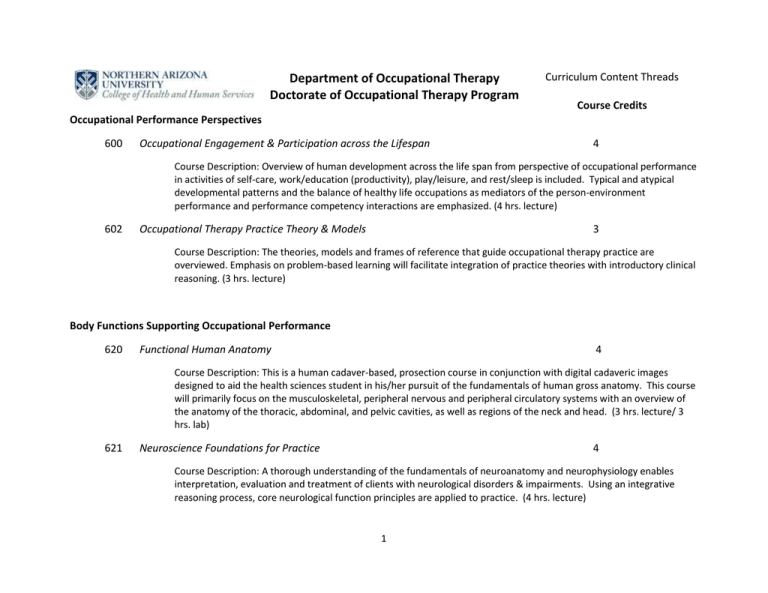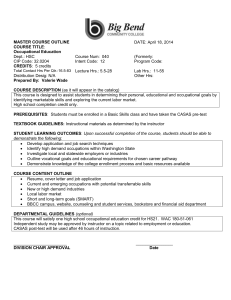Department of Occupational Therapy Doctorate of Occupational Therapy Program Curriculum Content Threads
advertisement

Department of Occupational Therapy Doctorate of Occupational Therapy Program Curriculum Content Threads Course Credits Occupational Performance Perspectives 600 Occupational Engagement & Participation across the Lifespan 4 Course Description: Overview of human development across the life span from perspective of occupational performance in activities of self-care, work/education (productivity), play/leisure, and rest/sleep is included. Typical and atypical developmental patterns and the balance of healthy life occupations as mediators of the person-environment performance and performance competency interactions are emphasized. (4 hrs. lecture) 602 Occupational Therapy Practice Theory & Models 3 Course Description: The theories, models and frames of reference that guide occupational therapy practice are overviewed. Emphasis on problem-based learning will facilitate integration of practice theories with introductory clinical reasoning. (3 hrs. lecture) Body Functions Supporting Occupational Performance 620 Functional Human Anatomy 4 Course Description: This is a human cadaver-based, prosection course in conjunction with digital cadaveric images designed to aid the health sciences student in his/her pursuit of the fundamentals of human gross anatomy. This course will primarily focus on the musculoskeletal, peripheral nervous and peripheral circulatory systems with an overview of the anatomy of the thoracic, abdominal, and pelvic cavities, as well as regions of the neck and head. (3 hrs. lecture/ 3 hrs. lab) 621 Neuroscience Foundations for Practice 4 Course Description: A thorough understanding of the fundamentals of neuroanatomy and neurophysiology enables interpretation, evaluation and treatment of clients with neurological disorders & impairments. Using an integrative reasoning process, core neurological function principles are applied to practice. (4 hrs. lecture) 1 622 Conditions Impacting Occupational Performance 4 Course Description: An overview of medical conditions to provide an understanding of the diagnosis and treatment of common physical, musculoskeletal, psychological and neurological disorders encountered during occupational therapy assessment and intervention across the lifespan is presented. (4 hrs. lecture) 623 Human Movement for Occupation 3 Course Description: Movement is analyzed using motor learning, motor control, motor development, kinesiological theories, and applied principles that contribute to functional human performance. (2 hrs. lecture, 3 hrs. lab) Occupational Therapy Toolkit 631 Occupational Performance Evaluation & Assessments 3 Course Description: An introduction to evaluation processes in occupational therapy including observation, interviewing, psychometrics (tests and measurement theories, methods, scales, procedures, statistics, and test interpretation) ethics, assessment tools and assessment administration is provided. This course is introductory, in nature, and serves as the foundation for learning about specific assessments in future intervention courses. (2 hrs. lecture, 3 hrs. lab) 632 Client Communication & Engagement in the Therapeutic Process 3 Course Description: Theories and practice of effective interpersonal communication and group processes for therapeutic and reporting functions is presented. Topics will include therapeutic use of self (self-awareness), didactic and group interactions, and their application in occupational therapy practice. (2 hrs. lecture, 3 hrs lab) 633 Educational Strategies & Learning in Healthcare & Academic Settings 2 Course Description: One of the core principles in occupational therapy delivery, the teaching-learning process is studied and practiced. Activity analysis and learning strategies across a variety of service delivery contexts to promote performance, engagement and behavioral change is considered. (2 hrs. lecture) 2 Occupational Therapy Process 640 Biomechanical Function & Occupational Performance 4 Course Description: Theories and intervention strategies related to strength, endurance, joint function, and voluntary control over movement will be covered. Superficial and deep physical agent modalities, mobility equipment, ergonomics and human factors are discussed. (3 hrs. lecture/3 hrs. lab) 641 Psychosocial Function, Behavioral Health & Occupational Performance 4 Course Description: The social and psychological theories and intervention strategies in occupational therapy are presented. Focus will be on roles, stress management, interests, self-esteem, social conduct, and self-management related to all disabilities. (3 hrs. lecture. 3 hr. lab) 642 Neurological & Sensory Function & Occupational Performance: Child 4 Course Description: Neuromotor and neurosensory intervention strategies in occupational therapy for pediatric populations are covered. Focus will be on the application of neurophysiological principles, sensorimotor learning and performance, and specific intervention strategies as related to the infant through adolescent stages. The influence of developmental and motor learning theories and approaches on evaluation and treatment will also be discussed. (3 hrs lecture, 3 hrs lab) 643 Neurological & Sensory Function & Occupational Performance: Adult 4 Course Description: Neuromotor and neurosensory intervention strategies in occupational therapy for adult populations are covered. Focus will be on the application of neurophysiological principles, sensorimotor learning and performance, and specific intervention strategies as related to the young adult through geriatric client. The influence of developmental (maturational) and motor learning theories and approaches on evaluation and treatment will also be discussed. (3 hrs. lecture, 3 hrs. lab) 644 Environmental Adaptation & Rehabilitation Technology 3 Course Description: This course covers the assessment and modification of the physical environment to enhance occupational performance including computer resources, assistive technology, home modification, driving and environmental controls, and environmental accessibility. (2 hr. lecture, 3 hrs. lab) 3 645 Cognitive & Perceptual Function & Occupational Performance 3 Course Description: The application of the interrelated intervention processes of cognition and perception in order to perceive (sense), organize, assimilate and manipulate information is discussed. The contribution of cognitive and perceptual abilities enable an individual to process information, learn, generalize, and problem solve is analyzed. (3 hrs lecture) 646 Upper Extremity Function and Occupational Performance 2 Course Description: Interventions with orthopedic-based upper extremity conditions to optimize functional use of the hand and arm are analyzed. Emphasis on physical aged modalities, orthotics fabrication & application, hand rehabilitation methods along with an introduction to training and utilization of prosthetics and emerging robotics is included. (1 hr. lecture, 3 hrs. lab) 648 Community, Population & Sustainability Approaches 4 Course Description: This course focuses on the role of the occupational therapist in population-focused and communitybased practice settings that are sustainable, ecologically-valid, preventative and health promoting for diverse and underserved individuals and contexts. Effective program design reflecting social justice, well-being, quality of life considerations as well as beneficial Interprofessional and organizational collaborations is emphasized. (4 hrs lecture) 748 Integrated Practice Seminar 3 Course Description: Focus will be on the application of neuro-physiological principles, sensorimotor learning and performance, cognitive & perceptual learning and performance, application of principles and psychosocial perspectives. Specific intervention strategies as related to the various populations across the lifespan will be practiced and enhanced. (2 hr. lecture, 3 hrs. lab) Scholarship of Practice 650 Evidence-based Practice & Professional Communication 3 Course Description: An introduction to the scholarly skills of locating, organizing and critically-appraising research literature related to practice is presented. An overview of professional communication style and dissemination skills is included. (2 hrs. Lecture; 3 hrs. lab) 4 651 Scholarship of Practice Approaches and Designs 4 Course Description: The student is introduced to each phase of the research process, including scholarly professional communication processes and skills. Discussions focus on the quantitative research & qualitative inquiry as the foundation for professional evidence. (4 hrs lecture) 652 Practice-Scholar Proposal Development Seminar 2 Course Description: The development of a research project proposal will guide the capstone scholarly experience. The purpose is to promote scholarly endeavors that will describe and interpret the scope of the profession, establish new knowledge, and interpret and apply this knowledge to practice. (2 hrs lecture) 701 Practice-Scholar Apprenticeship 7 Course Description: This is a four semester faculty-mentored research experience. The student will design a practice scholar capstone project that reflects the scope of the profession, establishes new knowledge, and/or applies this knowledge to practice. The outcomes may include, but are not limited to, completing a literature review, internal review board (IRB) approval, data processes, and dissemination of the research project. (4 hrs. lecture, 9 hrs. lab) Practice Competence 601 Practice Competency II & Fieldwork Level IA, IB, & IC 6 (var. cr. 2/semester x3; # fieldwork placements –each 1 week long) Course Description: This course includes practice competency activities to synthesize learning and demonstrate reflective clinical reasoning across the semester coursework. In addition, the student completes three one-week fieldwork experiences, one per semester. The first one will be in psychosocial and behavioral health. The context for the other two will be coordinated by the program to fulfill curriculum outcomes. (1 hr. lecture, 3 hrs. lab) 660 Practice Competency I 1 Course Description: The student will complete competency activities to synthesize learning and demonstrate reflective clinical reasoning across the semester’s coursework. Skills requisite for the practice competencies will include case issue identification, inter-professional collaboration and prioritization and professional reasoning. (1 hr. lecture) 5 762 Practice Competency III 1 Course Description: Competency activities will be completed to synthesize learning and demonstrate reflective clinical reasoning across the semester coursework. Skills requisite for practice competency and interprofessional education activities will be included. (1 hrs. lecture) 708 Fieldwork Level II 24 (Note: 4 fieldwork placements - each 6 weeks in duration = 24 weeks) Course Description: The goal of Level II fieldwork is to develop as a competent, entry-level, generalist occupational therapist. This fieldwork is a 24 week, full time, in-depth experience in delivering occupational therapy services to clients through engaging purposeful and meaningful occupation, research, and administrative activities. The student will see a variety of clients across the lifespan in a variety of settings. (24 hrs. lecture) Practice-Scholar Leadership 670 Health Policy & Advocacy in Service Delivery Systems 2 Course Description: An overview of the United States healthcare system, as well as laws and policies relating to all healthcare professions, generally, and to the field of occupational therapy, specifically is studied. The focus of this course will be to understanding how to interpret as well as advocate for laws and policies that influence the work done by occupational therapists. (2 hrs. lecture) 771 Program Leadership & Administrative Processes 3 Course Description: The basic principles of organization and administration of occupational therapy programs are introduced. Supervision, planning, budgeting, quality management, staffing, and program development will be presented. (3 hrs lecture) 772 Inspired & Emerging Practice through Visionary Leadership 3 Course Description: The approaches to leadership in traditional and emerging practice settings is emphasized in the context of professional development and behaviors, strategic planning and visioning, mentoring and professional 6 responsibilities across the roles of practice scholar, fieldwork educator, entrepreneur, faculty, consultant, advocate, case manager, navigator and servant leader. (3 hrs lecture) Residency & Capstone 761 Residency Professional Development Plan 2 Course Description: An individualized, professional development plan will be designed and approved to guide the development and implementation of the 16-week residency experience [OTD 791]. The plan will reflect the desired outcomes from the residency experience which are to acquire practice-scholar competencies that will advance skills beyond those of the generalist. (2 hr. lecture) 790 Residency Qualification 1 Course Description: The purpose of this course is for students to demonstrate entry-level practice competency, which is required prior to the commencement of the doctoral residency. The competency consists of a certification practice exam in which students must demonstrate proficiency. (1 cr. lecture) 791 Practice-Scholar Residency (16 weeks) 16 Course Description: The doctoral residency develops occupational therapists with advanced skills (those that are beyond a generalist level) and integral to acquiring deeper practice-scholar competencies reflecting the degree and program’s curriculum design. The students will implement the residency professional development plan design in OTD 790. (16 hrs. lecture, 640 clock hrs.) 792 Practice-Scholar OTD Capstone 2 Course Description: The student will complete an individually-mentored, increasingly self-directed, scholarly project as the culminating activity of the doctoral program that relates theory to practice or other professional functions. The demonstration of synthesis of advanced knowledge gained throughout the curriculum and practice-scholar apprenticeship process will reflect through an individualized portfolio. (2 hrs. lecture) 7 OTD Total Credits Cr 138 Fieldwork Level I 3 cr. Fieldwork Level II 24 cr. Residency 16 cr. 43 cr. (31% of total) 8
